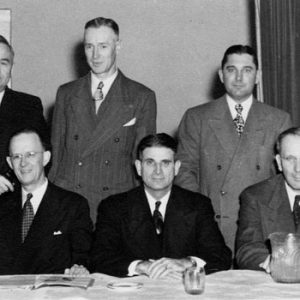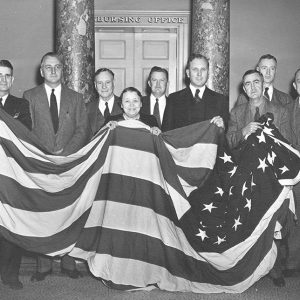calsfoundation@cals.org
Ezekiel Candler "Took" Gathings (1903–1979)
Ezekiel Candler “Took” Gathings represented Arkansas’s First Congressional District for thirty years (1939–1969). Throughout this period, he championed the interests of the neo-plantation elite who dominated politics and society in that region and was one of a powerful bloc of conservative Southern Democrats who frequently fought against social reform legislation introduced by more liberal members of their party.
“Took” Gathings was born the youngest of eight children of Melville W. Gathings and Virgie Garner Gathings on November 10, 1903, in Prairie, Mississippi. As an infant, his parents referred to him as “Sugar,” which his two-year-old brother pronounced “Tooker”; hence, the nickname that eventually supplanted his given name. His family later moved to Earle (Crittenden County), where he graduated from high school. He attended the University of Alabama for a time but left before earning a degree in order to enroll at the University of Arkansas School of Law. After his graduation in 1929, Gathings practiced law in Helena (Phillips County) and Earle before settling in West Memphis (Crittenden County), where, in 1934, he won the first of two terms in the state Senate.
Gathings defeated incumbent William Joshua Driver in the Democratic primary election of 1938 and took office in the U.S. House of Representatives the following January. On April 6, 1939, the new congressman married Tolise Kirkpatrick; the couple later had a son and a daughter.
Gathings’s district then encompassed eleven counties in eastern Arkansas: Clay, Craighead, Crittenden, Cross, Greene, Lee, Mississippi, Phillips, Poinsett, St. Francis, and Woodruff. Gathings proved to be a diligent legislator, often voting on more than ninety percent of the bills from each session, while his staff efficiently processed routine constituent requests for help with pensions, information on a family member in the armed forces, or other matters.
In 1944, Gathings secured an appointment to a valuable post on the Agricultural Committee. Farming, especially the growing of cotton, was big business in Arkansas, and the first district comprised most of the state’s portion of the Mississippi River Delta, where cotton was king. He remained on the Agricultural Committee until his retirement, eventually heading the cotton subcommittee, in which he actively promoted policies that favored the large producers in his district: high price supports, low tariffs, and abundant agricultural credit. When labor shortages during and after World War II threatened to disrupt harvests, Gathings and other cotton belt representatives arranged for prisoners of war and Mexican Americans to be imported for the task.
Gathings solidified business support by working with Senator Hattie Caraway of Jonesboro (Craighead County) to obtain New Deal work projects for his district. Throughout eastern Arkansas, residents found employment constructing courthouses, bridges, and numerous other public improvements, and wages from these endeavors revitalized local economies ravaged by the Great Depression. Gathings was less successful in securing large sums of defense spending for Arkansas during World War II, given that the state was hobbled by an uneducated workforce and poor infrastructure. He did, however, help to convince the U.S. Air Force to reopen a former training facility at Blytheville (Mississippi County) in 1955 and convert it into an important Strategic Air Command base. Later known as Eaker Air Force Base, the airfield was a financial mainstay of the region until its closing four decades later.
On social issues, Gathings reflected the views of white conservatives. He vehemently opposed the movement for equality for African Americans. In 1948, he supported the presidential candidacy of South Carolina governor J. Strom Thurmond. The platform of Thurmond’s States’ Rights Democrats consisted of strict racial segregation and opposition to federal civil rights laws, and over his career, Gathings proved a steadfast ally of people such as Thurmond. Among his many votes in defense of white supremacy were those against repealing the poll tax in 1945 and against the landmark Civil Rights Act of 1964 and the Voting Rights Act of 1965. Explaining his stand, Gathings offered: “The Negro in the South is a happy person, he understands the members of the white race and they understand him.”
Gathings held equally traditional views toward organized labor and voted in favor of the 1947 Taft-Hartley Act, which prohibited the closed (union) shop and secondary boycotts. He continued to be a reliable voice against weakening this act, which served to restrain labor unions in the South. Gathings also favored legislation limiting strikes in certain industries and usually voted against increases in the federal minimum wage.
In 1965, Gathings broke ranks with many conservatives when he joined other Democrats to pass the legislation authorizing the Medicare system. In general, however, he opposed social welfare programs. Although willing to spend liberally to fight communism, he and other conservatives beat back efforts to enact a universal healthcare program and delayed federal grants for education and urban housing. With his roots in the Bible Belt, the congressman gladly chaired a special committee during the 1950s that attempted to censor supposedly immoral paperback books and other publications.
Gathings chose not to run for reelection in 1968 and returned to his law practice in West Memphis. In 1978, officials named the new federal building in Jonesboro in his honor. Gathings died in West Memphis on May 2, 1979, after suffering a heart attack while speaking to a local business group. He is buried at Crittenden Memorial Park in Marion.
For additional information:
Bowman, Michael. “‘Immoral or Otherwise Offensive Matter’: Took Gathings’ 1952 Investigation of Broadcasting.” Arkansas Historical Quarterly 75 (Spring 2016): 47–61.
Congress and the Nation, 1945–1964: A Review of Government and Politics in the Postwar Years. Washington DC: Congressional Quarterly Service, 1965.
E. C. Gathings Collection. Dean B. Ellis Library Archives and Special Collections. Arkansas State University, Jonesboro, Arkansas.
“Ex-lawmaker Dies at 75.” Arkansas Gazette. May 3, 1979, p. 1A.
Morgan, Sam. “Elite Dominance in the Arkansas Delta, from the New Deal to the New Millennium.” PhD diss., University of Mississippi, 2005.
Tilney, Jack S. “Containing Obscenity: The Gathings Committee, Moral Crusades, and Paperback Books.” MLIS thesis, San Jose State University, 2011. Online at https://scholarworks.sjsu.edu/etd_theses/4076/ (accessed July 7, 2022).
Stallings, Jim. “The Gathings Committee: Censorship, Society, and Paperback Literature in the 1950s.” MA thesis, University of Arkansas at Little Rock, 2014.
U.S. Work Projects Administration Writers’ Program. Arkansas: A Guide to the State. New York: Hastings House, 1941.
Sam Morgan
Arkansas State University
 World War II through the Faubus Era, 1941 through 1967
World War II through the Faubus Era, 1941 through 1967 Gathings Federal Building
Gathings Federal Building  Tolise Gathings
Tolise Gathings  Ben Laney with Congressional Delegation
Ben Laney with Congressional Delegation  Senators and Representative: 1938
Senators and Representative: 1938 




Comments
No comments on this entry yet.